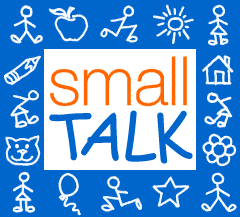Approaching the "Terrific Two’s"
At this stage your child enjoys helping you do things around the house. Take the opportunity to talk to your child about the task the two of you are doing. This encourages the learning of new words. Singing and reciting nursery rhymes together also helps your child’s speech and language grow.
By 21 months, most children will
- point to a picture or sign, such as when asked "Where's McDonalds?"
- play with toys and pretend to do things like feeding a doll or going in a car
- say at least 20 or more words
- follow directions such as "drink your juice" or "sit down please"
By 24 months, most children will
- understand more than they can say
- say two words together like "more milk"
- ask "what¹s that?" (may sound like "wha dat" or "whatssat")
- pick one thing out from a group of objects, such as a cup
how you can help your child’s speech and language grow
- be a good speech model - use correct words and phrases without correcting your child directly
- talk about new words such as "on", "under", "broken", "open", "jumping"
- read lots of books together - let your child choose books that he/she likes
- play children's music and stories and listen with your child
- sing songs and recite nursery rhymes together
- praise your child's efforts to communicate
- talk about new places and experiences before you go, while you are there, and when you get home
- expand what your child says - if your child says "dog", you say "big dog"
When to call for help
- Your child can only say about ten words
- Your child does not pretend with toys
- You have a hard time understanding what your child says
- Your child uses fewer than 50 words or does not put two words together

